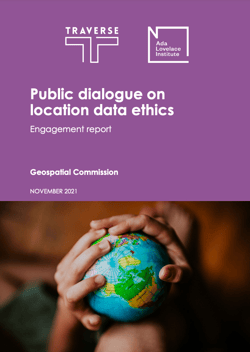Geospatial Commission releases report on location data ethics
The Geospatial Commission has published the findings of an independent public dialogue on location data ethics - Public Dialogue on Location Data Ethics.
The Geospatial Commission is an expert committee that sets the UK’s geospatial strategy and promotes the best use of geospatial data. Providing guidance on how to unlock value from sensitive location data while mitigating security, ethical and privacy risks is a key commitment of the UK Geospatial Strategy.
 According to the report, public attitudes to the use of location data are:
According to the report, public attitudes to the use of location data are:
- Location data is viewed as a subset of an individual's personal data
- Personally identifiable data was the biggest concern
- Location data benefits were emergencies, planning, health, convenience
- Location data concerns were data breaches and misuse, privacy and discrimination
- Opportunities were collective, whereas risks were individual
- Location data ethics are complex
The widespread use of new technologies means that data about our lives, including location data, is available in increasing frequency, detail and accuracy, driving innovation and better services.
In order to benefit from widespread use of location data, the Geospatial Commission views that it is important for data to be used in a way that mitigates concerns and retains public confidence.
 "The evolution of the UK’s geospatial ecosystem presents great opportunities to realise significant economic, social and environmental value," said Minister of State for the Cabinet Office, Lord True CBE. "The public dialogue report underlines that as we seek to capitalise on these benefits we will always aim to do so in a way that carries the confidence of the public and addresses any concerns."
"The evolution of the UK’s geospatial ecosystem presents great opportunities to realise significant economic, social and environmental value," said Minister of State for the Cabinet Office, Lord True CBE. "The public dialogue report underlines that as we seek to capitalise on these benefits we will always aim to do so in a way that carries the confidence of the public and addresses any concerns."
This public dialogue opened a conversation with 85 members of the public from all four nations to gather evidence on public perceptions about location data use. The dialogue was supported by an independent and expert Oversight Group, which provided expert support and quality assurance from a diversity of perspectives.
 "This report on public attitudes about location data is one of the first of its kind and I look forward to exploring how it can help inform the Geospatial Commission’s work on location data ethics," said Edwina Dunn OBE, Independent Commissioner of the Geospatial Commission and Interim Chair of the Centre for Data Ethics and Innovation. "The findings will also play an important role in supporting the government’s vital work to enable the trustworthy use of data and AI."
"This report on public attitudes about location data is one of the first of its kind and I look forward to exploring how it can help inform the Geospatial Commission’s work on location data ethics," said Edwina Dunn OBE, Independent Commissioner of the Geospatial Commission and Interim Chair of the Centre for Data Ethics and Innovation. "The findings will also play an important role in supporting the government’s vital work to enable the trustworthy use of data and AI."
The dialogue is one of the UK’s first on location data and was delivered by public engagement specialists Traverse and researchers from the Ada Lovelace Institute. Today’s report provides evidence on public perceptions about location data use, offering valuable insights into what citizens believe are the key benefits and concerns.
The project was launched in March and co-funded by the Geospatial Commission and UK Research and Innovation’s Sciencewise programme.
The findings outlined in this report will influence the guidance on location data ethics that the Geospatial Commission intends to publish in 2022 and help deliver the UK Geospatial Strategy.







